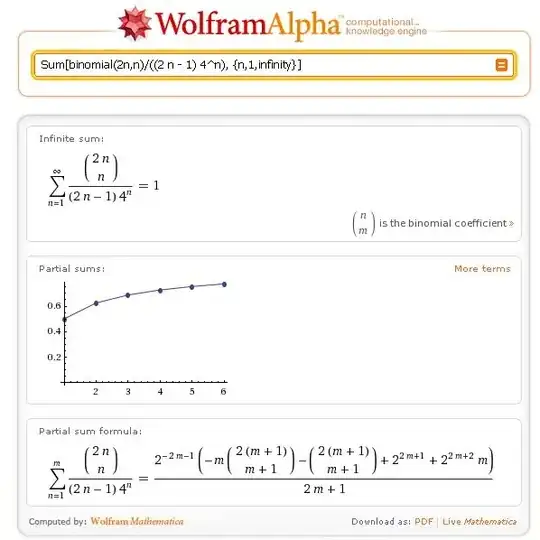I don't think the series diverges.
$$ \frac{1 \cdot 3 \cdot 7 \cdots (2n-3)}{2 \cdot 4 \cdot 6 \cdots 2n}$$
$$ = \frac{{2n \choose n}}{(2n-1)4^n} = \frac{1}{(2n-1)\sqrt{\pi n}}(1 + O(\frac{1}{n}))$$
using the approximation
$$\frac{ {2n \choose n}}{4^n} = \frac{1}{\sqrt{\pi n}}(1 + O(\frac{1}{n}))$$
and so the series must converge! Perhaps you have a mistake in your computation?
For a more elementary proof of convergence, see the end of the answer.
I believe you should be able to compute it using the series expansion for
$$\frac{1}{\sqrt{1-x^2}} = \sum_{k=0}^{\infty} \frac{{2k \choose k} x^{2k}}{4^k}$$
(you will need to subtract some terms, divide by $x^2$ and integrate).
An elementary proof of convergence.
We will show that
if $\displaystyle S_n = \frac{1 \cdot 3 \cdots (2n-1)}{2 \cdot 4 \cdots 2n}$ then
$\displaystyle S_n \le \frac{1}{\sqrt{n+1}}$
This proves the partial term of your series, which is $\displaystyle \sum_{k=2}^{n} \frac{S_k}{2k-1} < \sum_{k=2}^{\infty} \frac{1}{(2k-1)\sqrt{k+1}} < C$ (for some constant $C$), and thus is bounded above. Since the series is monotonically increasing and bounded above, it is convergent.
We will prove that $\displaystyle S_n \le \frac{1}{\sqrt{n+1}}$ by induction on $n$.
For $n=1$ it is clearly true.
Now $S_{n+1} = S_n \frac{2n+1}{2n+2}$
Consider $\displaystyle 1 - \frac{2n+1}{2n+2} = \frac{1}{2n+2} \ge \frac{1}{\sqrt{n+2}(\sqrt{n+2} + \sqrt{n+1})} = \frac{\sqrt{n+2} - \sqrt{n+1}}{\sqrt{n+2}}$
Thus $\displaystyle \frac{2n+1}{2n+2} \le \frac{\sqrt{n+1}}{\sqrt{n+2}}$ and so
$\displaystyle S_{n} \le \frac{1}{\sqrt{n+1}} \Rightarrow S_{n+1} \le \frac{1}{\sqrt{n+2}}$
